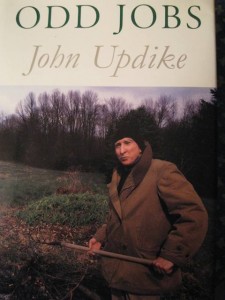Ann Marie Hourihane is an Irish Times journalist who wrote a good book a few years ago about the so-called ‘Celtic Tiger’ — Ireland when it was the poster child of European development. Now she’s back doing the same thing for the bust. Last week she went to Merlin, an auction house that specialises in disposing of cars and vans that have been repossessed by hire-purchase companies. Her account is a good example of sensitive, perceptive reporting which encapsulates an impersonal phenomenon in human terms.
Serkan Erke is from Turkey, and at the auction warehouse, his work colleagues call him Sergio. He looks at the date on the label and says: “This one is fresh. I just did it today.” An empty suitcase stands by itself. It is a mournful business. Imagine if someone cleaned out your car. These are the contents of a Volkswagen Golf. There is a high-heeled patent-leather shoe. There are two carrier bags of Christmas presents, still wrapped. Sergio could not decide if these gifts were for the owner of the car, or from her. “I didn’t look, because it’s personal.” But the gifts are all wrapped in various types of paper, so I think they might have been bought by the former owner of the car. Maybe she didn’t have the time, or the heart, to distribute them. We also find an unopened bottle of vodka. “You’d be sorry for her,” says Sergio.
There’s a young man’s sports kit here, from another Volkswagen Golf, with his soccer boots, his underpants, and his Fructis hair gel. The hair gel is called Manga Head. The jar reads “Free style putty for messed-up spikes”. Out of a Mercedes comes an Evening Herald , some Turkish Delight and a guide to some bloodstock sales.
If these personal items are not claimed within a year, they are dumped. Until then they are stored in the loft above the valeting bay at Merlin. A pink heart-shaped cushion that says “Baby on Board”. An entire toolbox, carefully organised, with the owner’s initials carved into the head of the mallet. “There’s a barbecue around here somewhere,” says Sergio. “And sometimes a pile of buggies.”
Sergio lives in Navan with his Irish wife and their two little girls. “The finance companies gave the money so easy,” he says. “People can only afford a Micra, but they get a BMW. I’d never get finance. If they take your car away from you, you can’t work. I drive 90 miles a day.”
She attends an auction. It is, she writes,
like a circus. For some time now there have been so many cars and vans to sell that Merlin has been running a two-lane auction twice a week. Two lanes of cars, two rostrums, two auctioneers running simultaneously. According to Patrick O’Reilly, in 2007 the average value of cars Merlin sold at auction was €8,000-€9,000. In 2008 it was €13,000-€14,000. In June 2006 private buyers made up 7 per cent of Merlin’s customers. Now they make up more than 40 per cent.
Repossessions of commercial vehicles have gone up 147 per cent since July 2007 and prices of commercial vehicles have come down by up to 50 per cent. The repossession of private cars has gone up 100 per cent since September – and is expected to exceed 5,000 private vehicles this year.
Hourihane also went to see a dealer in Galway whose showroom I’ve often passed when it was crammed with gleaming, top-of-the-range Mercedes cars.
James McCormack started working in the family car business, Western Motors, in 1988. His mother Anne took over the company when his father died in 1965.
James is her youngest child and the one who always loved cars. “My first car was a Golf diesel. I had the stereo strapped to the passenger seat. Great car.”
Now Western Motors employs 40 people at its huge showroom just outside Galway and another 16 in its new Drogheda showroom, which opened in January last year. “A disastrous year to open a new business,” as McCormack ruefully puts it. “This time last year I had cars arriving on transporters and people literally standing waiting for them. They were pointing up at the transporter and saying ‘I want that one’. These were €180,000, top-of-the-range Mercedes. In January 2008 we would have delivered 10 €100,000-plus cars, maybe 20. This year we delivered one.”
The only expensive car McCormack sold this year went to a green-energy millionaire…
Because the boom in Ireland was so dramatic, the downturn is correspondingly disastrous. And on top of purely economic factors, there is the unravelling of criminality and corruption in the banking, planning and property-development sectors.
It looks as though the country even had it’s own cut-price Ponzi scheme. Even to those inured to the pervasive corruption of Irish politics and planning, it’s shocking.
Needless to say, though, nobody responsible for the chaos is in the least bit apologetic. Sean FitzPatrick was a big mover and shaker (and Fianna Fail groupie) who was Chairman of Anglo-Irish Bank — until it was revealed that he was ‘warehousing’ his colossal (€129 million) loans — i.e. passing them temporarily to a building society for a few days every year — to keep them out of the Bank’s annual report. This ingenious practice apparently escaped the notice of the Irish banking regulator, but eventually was too gross to conceal. FitzPatrick resigned on December 18th, issuing a statement that while what he had done might have been “inappropriate” it was certainly not illegal.
Another Anglo-Irish investor was businessman Sean Quinn — who incidentally lost €1 billion from his shares in the enterprise. At the end of October last year, the regulator slapped a fine of €3.25 million on his insurance company and fined him €200,000 personally for failing to notify a loan of €288 million to a related company. It turned out that the loan was made to fill the hole left by Anglo Irish’s collapsing share price.
Was Quinn abashed or apologetic about any of this? Not a bit of it.
Responding to negative criticism of his family’s stock market investments, he dismissed speculation of any wrongdoing as “outlandish”. Mr Quinn resigned from the board of Quinn Insurance last October for failing to notify the Financial Regulator about loans of €288 million to other Quinn companies which were used to invest in Anglo.
Commenting on this yesterday, he said that “there was no big issue” with this loan, and while it was a breach of regulations he did not view it as improper.
“We said at the time, and we still say, there was never any risk to policyholders, shareholders, there was no risk to anybody,” he said.
“We don’t owe anybody any great apology,” he continued.
There’s a joke going round: “Q. What’s the difference between Ireland and Iceland? A: One letter and six months.” But it’s not a joke really. Ireland is effectively bankrupt. Moody’s, the credit rating agency, says that it’s downgrading the country’s rating from ‘stable’ to ‘negative’. At the world Economic Forum, Peter Sutherland, the former EU Commissioner and current Chairman of BP said — on the record — that Ireland’s economy has remained afloat solely because of the country’s membership of the euro. If the country were not in the single European currency, he went on, its economy would be “in a state of destruction”.
He described as “absolutely appropriate” the comparison between Ireland and Iceland, a non-euro state whose economy has collapsed, made by European Commission president Jose Manuel Barroso during a discussion on the European economy in Davos.
“He was quite right to make it,” Mr Sutherland said. “There is no point trying to pretend now what our condition is. That condition is deeply, deeply worrying, so it behoves everybody to recognise this and to react accordingly.”
So what happens next? The government is committed to publishing its recovery survival plan next Thursday. It had better be good. In those boom years my countrymen “lost the run of themselves” as Frank McDonald puts it. They began to believe their own bullshit. They allowed costs to run out of control — to the point where Ireland became more expensive than any other country in Europe. A few months ago I went to a reunion of my ’68 Engineering class. The dinner was held in one of the new generation of ‘country house’ hotels that mushroomed in Ireland during the boom. Dinner cost €125 a head — excluding wine. And it wasn’t anything special — “starvation at €100 a plate” as my robust brother-in-law puts it. I’ve had better meals for £15 in Cambridge. It’s nuts — and it cannot continue.
Garret FitzGerald, the sainted former Taoiseach, has been banging on about this forever. He returns to the subject in his column yesterday.
What happened in this short period was that a doubling of current public spending sparked off a severe bout of inflation, causing prices here to rise two-and-a-half times faster than in the rest of the euro zone, ie by 30 per cent, as against 12 per cent in the economies of our EU partners. That 16 per cent deterioration in our competitiveness relative to our European partners totally halted the growth of Irish goods exports, losing us an important share of world markets.
That disastrous development, although repeatedly highlighted in this column, attracted little notice elsewhere, and even today receives much less attention than it deserves. Yet the whole future of our economy, after we emerge from our present multiple difficulties, will depend upon the extent to which we now take this opportunity to tackle effectively the excess of our pay levels above those of our EU competitors.
Will my countrymen take this opportunity? Don’t hold your breath.
LATER: Thanks to Kevin Cryan for spotting a typo.


